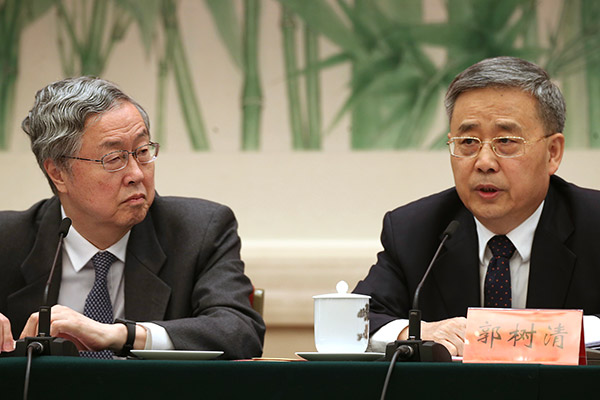Media Report

- Bloomberg reports: "The second day of a twice-a-decade meeting of China's Communist Party was dominated by news about the economy. Data released Thursday showed China maintaining its growth momentum, while the central bank chief played down speculation that the yuan could soon be allowed to trade more freely... As delegates settled down to discuss the party's constitution, the statistics bureau reported that China expanded a resilient 6.8 percent in the third quarter and revised up the pace of growth in the first two quarters. That level of expansion will likely give President Xi Jinping room to further rein in excess capacity and curb industry-caused pollution, while sustaining a growth rate that helps underpin the global economy... People's Bank of China Governor Zhou Xiaochuan said China would work to make the yuan a more freely convertible currency, though widening its trading band wasn't a focus. Zhou's comments follow market speculation that policy makers may soon further liberalize the currency. Zhou, 69, also added fuel to talk he'll soon retire after 15 years leading the PBOC: Tailed by reporters after leaving the meeting room, one asked Zhou 'aren't you retiring this year?' He replied that 'either way, it's happening soon.'"
- The New York Times reports: "China turned to a tried-and-true recipe to cook up another three months of respectable growth. Heavy lending by state-owned banks, brisk government spending and strong exports helped keep China's economy growing briskly and steadily. China's statistical agency said on Thursday that the economy had grown 6.8 percent in the July-to-September period, compared with the same quarter a year ago. President Xi Jinping had put heavy pressure on practically every government ministry to make sure that the economy put in a solid performance. The Chinese Communist Party's twice-a-decade congress began this week, and it's a time when the country's leaders want predictability and an image of strength. The figure announced on Thursday was similar to other results from recent quarters, a trend that makes many economists doubt the reliability of China's headline economic numbers. Still other figures — including retail spending, housing sales and trade figures — suggest an economy growing steadily under the guiding hand of the government."
- The Atlantic reports: "To enhance its economic and political clout, China has made substantial inroads across Southeast Asia on the back of multi-billion-dollar infrastructure and investment deals like the one in Cambodia. This is how China will engage with the world for the foreseeable future. At the 19th National Congress of the Communist Party of China on Wednesday, a political conclave held once every five years to present the leadership's governing agenda, Xi Jinping, arguably China's strongest ruler in decades, will solidify his rule and reinforce an expansive foreign economic platform that will shape the region for years to come. Such future dealings abroad are unlikely to come with any pledges toward democratization attached. In Cambodia, for example, China hasn't slowed its investments despite Hun Sen's crackdown on democracy and basic freedom. Facing vocal challenges from opposition groups ahead of next year's general elections, he has begun actively silencing pro-democracy institutions, expelling the U.S.-funded National Democratic Institute, forcing Radio Free Asia to close its Phnom Penh office, shuttering the The Cambodia Daily, jailing opposition party leader Kem Sokha on allegedly phony charges of treason and collusion with the United States, and calling for the withdrawal of Peace Corps volunteers. On Monday the National Assembly moved to redistribute all of the main opposition party's legislative seats."
Calendar
- 2017-10-18 China Is Quietly Reshaping the World
- 2017-10-17 China's Communist Party is holding its most important meeting in years: Here's what you need to know
- 2017-10-16 China stands at 'a new historic starting point,' Communist Party says
- 2017-10-15 China's Pollution Crackdown Is Gaining Momentum
- 2017-10-13 China’s trade with North Korea slumps as nuclear sanctions finally start to bite
- 2017-10-12 Big twice-in-a-decade meeting in China may have a curious market impact
- 2017-10-11 China treats its foreign aid like a state secret. New research aims to reveal it.
- 2017-10-10 Chinese yuan strengthens in a sign of 'overriding stability' ahead of the key 19th Communist Party Congress
- 2017-10-09 1.34 million officials have been punished for graft since 2013, Chinese watchdog says
- 2017-10-06 U.S. defers China aluminum foil dumping decision
News
- Bloomberg What We Learned on Day Two of China's Communist Party Congress
- The New York Times China's Economy Grew Steadily, Thanks to Loans and Homes
- The Washington Post Xi Jinping at China congress calls on party to tighten its grip on the country
- CNN China calls on US to 'abandon its prejudices' after Tillerson rebuke
- The Washington Post Move over, America. China now presents itself as the model 'blazing a new trail' for the world.
- CNBC China's central bank just warned of a sudden collapse in asset prices
- Reuters China's central bank warns of 'Minsky moment' as economy powers ahead
- Financial Times US company nears deal to create Forbes spin-off in China
- The New York Times China's Reform Hopefuls Watch for Names. Only One May Matter.
- Bloomberg The U.S. Lags Behind China in Spotting Cyberthreats
- The New York Times China's Reform Hopefuls Watch for Names. Only One May Matter.
- Bloomberg China's Top Bank Regulator Endorses Reform of Finance Industry
- Financial Times Chinese property boom props up Xi's hopes for the economy
- CNBC China reports 6.8% third-quarter GDP growth, meeting expectations
Commentary
- The Atlantic China's Plan to Buy Influence and Undermine Democracy
- Council on Foreign Relations China's Leaky Political Pipeline
- Atlantic Council Xi Seeks to Solidify Grip on China
- The Washington Post China's top leaders are meeting. What's at stake?
- Quartz Your five-minute summary of Xi Jinping's three-hour Communist Party congress speech
- Forbes Why The Ambiguity Of China's Belt And Road Initiative Is Perhaps Its Biggest Strength
